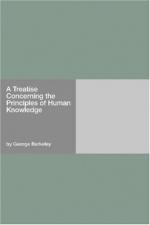133. If the doctrine were only an hypothesis it should be respected for its consequences.—By what we have premised, it is plain that very numerous and important errors have taken their rise from those false Principles which were impugned in the foregoing parts of this treatise; and the opposites of those erroneous tenets at the same time appear to be most fruitful Principles, from whence do flow innumerable consequences highly advantageous to true philosophy. as well as to religion. Particularly Matter, or the absolute existence of corporeal objects, has been shown to be that wherein the most avowed and pernicious enemies of all knowledge, whether human or divine, have ever placed their chief strength and confidence. And surely, if by distinguishing the real existence of unthinking things from their being perceived, and allowing them a subsistance of their own out of the minds of spirits, no one thing is explained in nature, but on the contrary a great many inexplicable difficulties arise; if the supposition of Matter is barely precarious, as not being grounded on so much as one single reason; if its consequences cannot endure the light of examination and free inquiry, but screen themselves under the dark and general pretence of “infinites being incomprehensible”; if withal the removal of this Matter be not attended with the least evil consequence; if it be not even missed in the world, but everything as well, nay much easier conceived without it; if, lastly, both Sceptics and Atheists are for ever silenced upon supposing only spirits and ideas, and this scheme of things is perfectly agreeable both to Reason and Religion: methinks we may expect it should be admitted and firmly embraced, though it were proposed only as an hypothesis, and the existence of Matter had been allowed possible, which yet I think we have evidently demonstrated that it is not.
134. True it is that, in consequence of the foregoing principles, several disputes and speculations which are esteemed no mean parts of learning, are rejected as useless. But, how great a prejudice soever against our notions this may give to those who have already been deeply engaged, and make large advances in studies of that nature, yet by others we hope it will not be thought any just ground of dislike to the principles and tenets herein laid down, that they abridge the labour of study, and make human sciences far more clear, compendious and attainable than they were before.
135. Having despatched what we intended to say concerning the knowledge of ideas, the method we proposed leads us in the next place to treat of spirits—with regard to which, perhaps, human knowledge is not so deficient as is vulgarly imagined. The great reason that is assigned for our being thought ignorant of the nature of spirits is our not having an idea of it. But, surely it ought not to be looked on as a defect in a human




